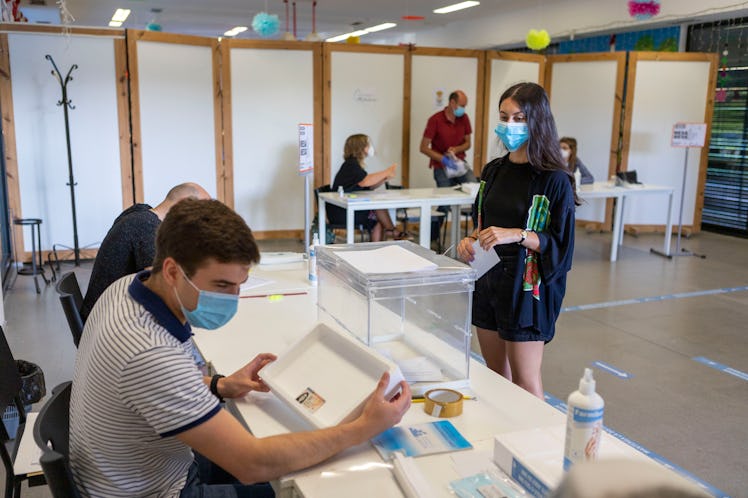
Here's What To Know About Missing School To Vote On Election Day
If you're a college student who wants to vote in the general election on Tuesday, Nov. 3, you might be wondering what your options are. Voting in person on Election Day can be inconvenient if you have a packed class schedule, and there aren’t many laws on the books about missing school to vote. Since Election Day has yet to be declared a national holiday, here’s what you should consider before you head to the polls on a school day.
As with most questions that come up about voting, there’s no set rule for giving voting-age students the day, or even just a few hours, off school on Election Day. Usually, a school will leave it to professors to decide, so it will depend on where you go to college. During the 2018 midterm elections, the University of Nevada at Reno (UNR) didn’t have a formal policy about class attendance on Election Day, but according to the Reno Gazette-Journal, that wasn’t a problem for most students who wanted to cast their ballot on Election Day. Like most schools, the decision is up to the professor, and students at UNR reported some professors made it clear it was important to vote, even if it meant missing classes. At the time, UNR’s communications director Kerri Garcia told the Gazette-Journal that the university faculty offers flexibility on attendance, despite no formal announcement.
As of Sept. 30, there is one state with a law aimed at making it easier for high school students to vote on Election Day. Illinois Gov. J. B. Pritzker signed legislation in January 2020, which makes it legal for high school students in the state to be excused from class for up to two hours, in order to vote, according to the Chicago Sun-Times. The State Journal-Register reports this bill applies to voting age high school students and allows high schools to set the times a student can be absent in order to vote for early voting and on Election Day.
Students in other states are working to make similar laws a reality at the college level. In 2018, students at Loyola Marymount University in California organized a campus shutdown alongside some faculty during the midterm elections to help make it possible to vote, despite not having an official policy on the matter. Meanwhile, at the University of California Berkeley, students are fighting to make Election Day a non-instructional day.
As students think about missing class to vote in a state where that right is not covered by law, there can be repercussions. If you need to miss a class to vote, make sure you talk to your professor about their attendance policy, and if they’d be willing to allow an exception if you need time to vote. If there is no Election Day attendance policy, regular attendance policies still hold, so make sure you’re familiar with them. It’s not a good idea to miss class to vote if you haven’t discussed it with your instructor, especially if you have a test or big project due on Election Day. Don’t forget to plan for the possibility of long lines, too — during the primary elections this past spring, some voters reported waiting hours and hours to cast their ballot.
Even if you can’t vote on Nov. 3, you should still make a plan to cast your ballot. As a college student, you can register in your home state or the state you attend school in, but not both. If you're registered in your home state, you can request an absentee ballot which you can return in the mail before Election Day. If you’re registered more locally, you may also have the option of early voting — 42 states, plus Washington, D.C., allow you to cast your ballot as early as a month and a half before Election Day. Some states don’t have absentee voting, so make sure you check your state’s rules. If you register in your school's state, you can check if you’re able to vote early in-person or by requesting an absentee ballot. You can check Vote.org to make sure you’re registered for the 2020 election, and you should also check voter registration deadlines, because some are as early as Oct. 3.
If you vote in person on Nov. 3, keep in mind the safety guidelines outlined by the Centers for Disease Control and Prevention (CDC) as of June 22. The CDC recommends you wash or sanitize your hands before entering and upon leaving a polling place, wear a cloth face covering over your mouth and nose, practice social distancing, and avoid going to the polling location during peak voting times, when possible, to lessen crowds.
Your voice matters. So does your vote. Make sure both are heard and counted in the 2020 election by registering to vote right now.
If you think you’re showing symptoms of coronavirus, which include fever, shortness of breath, and cough, call your doctor before going to get tested. If you’re anxious about the virus’s spread in your community, visit the CDC for up-to-date information and resources, or seek out mental health support. You can find all Elite Daily's coverage of coronavirus here.
This article was originally published on